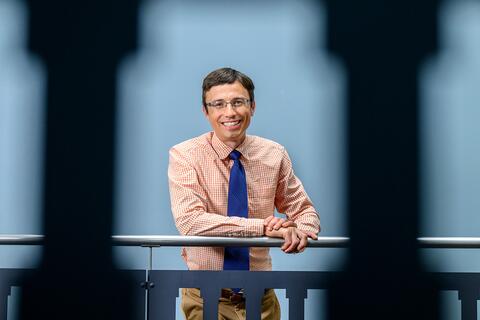
As an undergraduate at University of Illinois Urbana-Champaign, Allen Barton majored in civil engineering. Then, as he pursued his master’s in engineering at Illinois, Barton was exposed to research in social and family psychology. Suddenly his focus shifted from physical materials and sturdy structures to mental states and interiority.
“I was investigating what makes engineers tick, and then I realized—wait, I can actually do this research in families,” said Barton, an assistant professor and Extension specialist in human development and family studies and Collaboratory member at the Family Resiliency Center (FRC). “The ability in my work to study, support and strengthen families is sort of a dream.”
Barton’s family-centered prevention science research uses basic and applied methods to promote the health and well-being of children, adults and families. He investigates what makes some families strong and resilient, and he seeks effective interventions for strengthening families and fostering positive youth development.
As part of his research, Barton seeks to elucidate processes that account for why some families show resilience in the face of hardship. In particular, he identifies protective factors that have been overlooked in research to date.
One recent publication investigated what he termed a “cohesive family mindset.” Barton’s hypothesis is intuitive: families that thrive are more likely to exhibit a strong sense of “us” rather than “me.” That is, individuals in resilient families often feel that that they are part of something bigger than themselves.
The difficulty was in developing a good measurement for this phenomenon.
“Although scholars had highlighted cohesive family mindset conceptually, our study was one of the first efforts to actually develop and test a measure of such a construct,” said Barton, “Our results suggest that, at minimum, there is real benefit to families when individuals have a mindset that one’s happiness comes through meeting the needs of others rather than just your own. It pushes back on some thinking that has appeared in more Western, individualistic cultures.”
Other projects in his research program explore hypotheses that might be considered more counterintuitive, such as a recent paper showing the hidden physical health costs for minority youth who overcome adversity. For those high-achieving adolescents, resilience exacts an otherwise unseen physiological toll.
“Sometimes as a scientist you’re challenging norms and drawing out underlying assumptions,” Barton said. “Other times you’re highlighting ideas that might have been referenced in the past but were not rigorously studied.”
Barton’s hope is that findings from these empirical investigations can be translated into future interventions for families. Such programming efforts represent the applied side of Barton’s appointment. And if this pair of duties—performing basic science research and translating those findings for the state’s population—seem like too big a job for one researcher, Barton emphasized that he has been fortunate to work with excellent collaborators.
Collaboration was a key motivator for joining the FRC when he began as an assistant professor in 2019. “When you’re just starting out, finding senior people who can help guide a collaborative project is extremely valuable,” he said. “I began in engineering and came to my field late, but I love my job.”